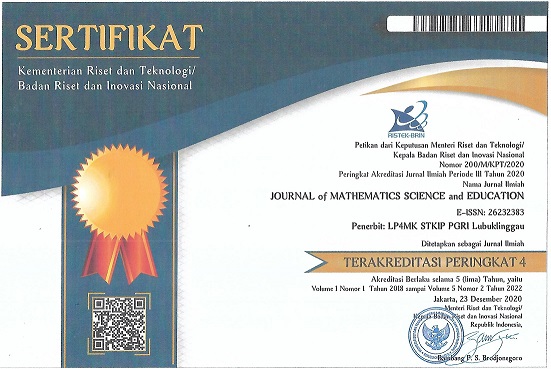HUBUNGAN SELF-EFFICACY DENGAN HASIL BELAJAR MATEMATIKA SISWA KELAS RENDAH
Abstract
This study aims to determine whether there is a significant relationship between students' mathematical self-efficacy and student learning outcomes in elementary grades. The research method used is descriptive method with the correlation approach. The instrument used for both variables is a scale of self-efficacy to see students' mathematical self-efficacy and student learning outcomes from the Final Examination (UAS). The self-efficacy scale contains 20 statements containing four alternative answers. The population of this study were all elementary school students, namely 156 students with a sample of 63 students. Data were analyzed with Pearson followed by t-test, previously obtained that the data of self-efficacy and mathematics learning outcomes were normally distributed and linear. Data on self-efficacy is 0.173> 0.05 and data on student mathematics learning outcomes is 0.2> 0.05. Linearity was fulfilled at 0.04 <0.05. Obtained tcount = 2,9255 while ttable = 1,9996, so tcount> ttable means that Ho is rejected. It can be stated that there is a significant relationship between self-efficacy and mathematics learning outcomes of elementary school low grade students.
References
Helma dan Edizon. 2017. Faktor-Faktor yang Mempengaruhi Hasil Belajar Matematika Siswa untuk Penerapan Bahan Ajar Kontekstual Mengintegrasikan Pengetahuan terkait Realistik. Jurnal Eksakta Pendidikan, 1 (1): 86-92.
Mujis, D., dan Reynolds, D. (2005). Effective Teaching Evidence And Practice. London: SAGE Publications.
Rifa’I, A & Anni, C.T. (2012), Psikologi Pendidikan, Semarang: Pusat Pengembangan MKU/MKDK-LP3 UNNES.
Siregar, N. 2016. Hubungan Keyakinan Orang Tua dengan Self-Efficacy Matematis Siswa Kelas IV. Rekognisi: Jurnal Pendidikan dan Kependidikan, Vol.1 (1): 64 – 73.
Pandra, V. (2011). Hubungan Teman Sebaya dan Minat Belajar terhadap Prestasi Belajar Matematika SISWA SMP. Jurnal Perspektif Pendidikan, 4, 59-68.
Woolfolk, A. Tanpa tahun. Educational Psychology Active Learning Edition Bagian Pertama. Terjemahan oleh: Soetjipto. 2009. Yogyakarta: Pustaka Pelajar.
Yufita dan Budiarto, 2006. Motivasi Kerja Guru ditinjau dari Self-Efficacy dan iklim sekolah (studi pada guru-guru yayasan “X”). Jurnal Ilmiah Psikologi Industri dan Organisasi, Vol.8 (2):181-195.

This work by Journal of Mathematics Science and Education is licensed under a Creative Commons Attribution-NonCommercial-ShareAlike 4.0 International License.

















